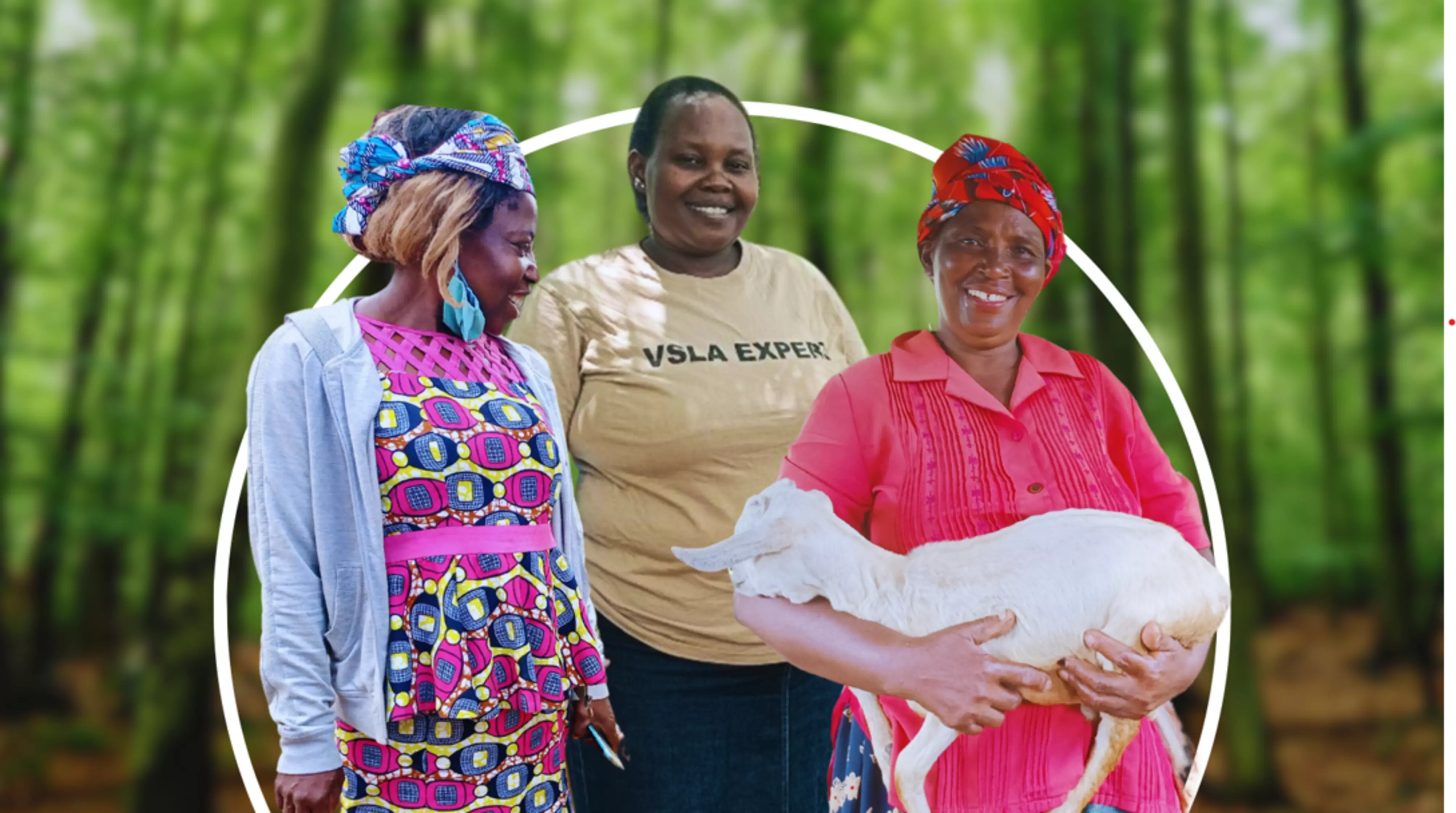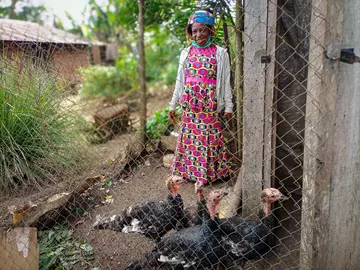
Across the world, women are driving conservation and economic change in their communities. From Djoum in Cameroon to Kenya’s national park-adjacent communities, and coastal and freshwater ecosystems in Mozambique and the Philippines, to ecotourism initiatives in Nepal, women are proving that sustainable livelihoods not only provide financial independence but also protect wildlife and habitats for future generations.
Through the support of our conservation initiatives, women like Madame SEM, Monica Musyoki, and Hellen Mueni have transformed their lives, reducing reliance on unsustainable practices while strengthening their local economies.
Madame SEM: Building a Future Through Sustainable Farming

In Djoum, Cameroon, Madame SEM has built a thriving poultry farm, offering an alternative to hunting and creating new opportunities for women in her community.
Learning New Skills and Innovating for Growth
Before starting her farm, Madame SEM and her husband attended a community meeting we organised that introduced them to the idea of alternative livelihoods. She received training in poultry farming, incubation, and sustainable animal husbandry, giving her the skills to turn a small venture into a growing business.
Determined to improve her methods, she began experimenting with different incubation techniques to hatch chicks more efficiently. She has since expanded her farm, raising poultry while continuing to apply the knowledge gained from our training sessions.
A Sustainable Alternative to Hunting
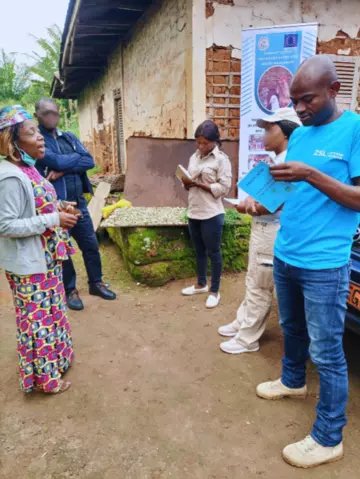
Her work directly contributes to conservation efforts in the Dja Biosphere Reserve.
"These activities have effectively reduced pressure on biodiversity. Communities spend more time raising chickens rather than hunting in the bush," she says.
With our training, she has learned better farming and incubation techniques, ensuring a long-term, sustainable livelihood.
A Role Model for Women in Her Community
Her success hasn’t gone unnoticed. Other women in Djoum seek her guidance, requesting chicks and small training sessions in farming and plantain banana production.
"Several women have shown interest in these activities and continue to pursue them. Even though I work alone, they come to me asking for chicks and guidance," she shares.
She now hopes to expand her farm, secure a new incubator, and inspire more women to become financially independent.
Monica Musyoki: Strengthening Communities Through Financial Independence
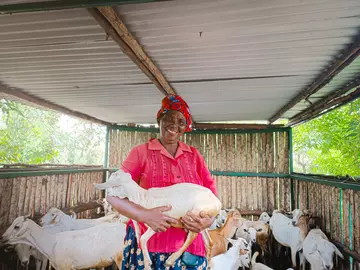
Thousands of kilometers away in Kenya, Monica Musyoki, a 64-year-old widow and livestock farmer, is leading a community banking group that empowers women while promoting human-wildlife coexistence.
How Conservation Changed Her Relationship with Wildlife
Before working with us and the Village Savings and Loans Association (VSLA), Monica saw predators as a constant threat to her livestock.
Living near a protected area, her community frequently lost goats to leopards, civet cats, genet cats, and hyenas. However, we introduced predator-proof kraals, which have transformed the way families protect their livestock.
"Before the construction of the kraal, we used to stay alert all night, resulting in poor sleeping habits. Now, we can sleep peacefully."
Additionally, our outreach meetings taught Monica about the role of wildlife in conservation and the economy.
"We learned conflict mitigation strategies and how to coexist with wildlife. Now, I understand that wildlife contributes to our economy and should be protected."
Leading a Women’s Banking Group for Financial Security
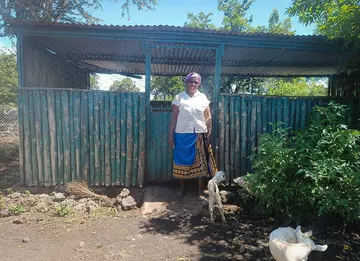
As chairperson of her community banking group, Monica plays a vital role in ensuring local women can save money, access loans, and invest in sustainable livelihoods.
Through the VSLA, Monica secured a low-interest loan to purchase a female goat, which has now given birth to three kids.
"The livelihood project gave me Galla goats, and the predator-proof kraal provided safety for my herd. Now, I can expand my livestock without fear of losing them."
An additional benefit to the project has been a community shoat plunge dip, which has made livestock disease management easier and more affordable.
Hellen Mueni: From VSLA Member to Community Leader
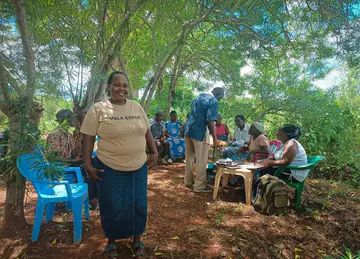
In Kenya, 35-year-old Hellen Mueni was drawn to our work for two reasons:
- Learning how to peacefully coexist with wildlife as a neighbor to a national park.
- Improving her financial independence through VSLA groups.
From VSLA Member to Teacher and Entrepreneur
Hellen became an active member of a VSLA group and was quickly recognized for her leadership skills. She was elected as the group’s secretary, responsible for record-keeping and monitoring financial activity.
Her involvement deepened when she was trained as a Village Agent, allowing her to establish and train new VSLA groups in her community.
"Now, my community calls me ‘The VSLA Teacher’ because I have helped establish so many groups."
Expanding Opportunities Through Poultry Farming
Through the project, Hellen’s group also received a predator-proof chicken coop, allowing them to engage in poultry farming without fear of losing their flocks.
"The chicken coop constructed by the project has motivated me to actively practice poultry farming because it is predator-proof."
She also took out low-interest loans through VSLA to expand her retail shop and pay for school fees.
Expanding Women’s Role in Conservation Globally
- Mozambique: Women in our Village Savings and Loans Associations (VSLAs) are investing in sustainable seafood production. By farming mussels and crabs instead of using harmful fishing methods, they are protecting marine ecosystems while securing stable incomes.
- Philippines: Women in our savings and investment groups are using microfinancing to launch businesses that support freshwater conservation, helping protect vital water sources while creating sustainable livelihoods.
Nepal: We are working with women’s groups in Chitwan-Parsa National Park to establish women-led ecotourism enterprises, giving women a stronger voice in conservation decision-making.
The Impact of Women in Community Banking
- 90% of Village Savings and Loans Association members in Mozambique are women.
- 3 VSLA groups are formed exclusively of women, ensuring financial independence and support.
- 70% of community savings group members in the Philippines are women.
These financial groups help women save, invest, and build sustainable livelihoods—empowering them to protect their families, businesses, and the environment.
A Brighter Future for Women in Conservation
Women like Madame SEM, Monica Musyoki, and Hellen Mueni are proof that when women are supported, entire communities and ecosystems thrive.
As we continue to invest in sustainable livelihoods, financial empowerment, and conservation training, we are helping build a future where both people and wildlife can flourish together.
